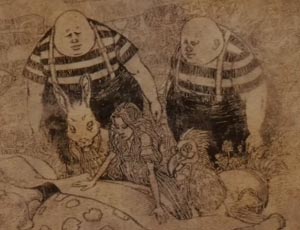|
||||||
In the Looking Glass world of Alice in Wonderland, Tweedledee’s “logic” makes perfect sense. In the real world – it’s nonsense – or to be more precise – suffers from both a formal and a non-formal logical fallacy.2 Yet it makes perfect sense to Tweedledee and Tweedledum. In the same manner, the logic of atheists makes perfect sense to them in their looking glass world where they protect themselves from the truth; they can’t see anything wrong with it – yet it is clear to others it is as fallacious as the flawed logic of Tweedledee and Tweedledum. When difficult questions are put to atheists about the nature of reality for which the atheistic worldview has no answer, atheists (and evolutionists alike) throw out fine sounding arguments. And like the Looking Glass characters, their answers have the form of validity, but upon close examination it is apparent their arguments are as fallacious as the logic used by the Tweedles. Let me give a couple of examples. Consider the question – Why is there something rather than nothing? For the Christian, there’s an easy answer: In the beginning, God created the heavens and the earth (Gen 1.1). For philosophers, it is a very deep philosophical question. In fact Martin Rees, cosmologist, astrophysicist and astronomer royal calls it the “preeminent mystery.”3 Such a formulation does not affirm the Christian worldview, but neither is it overtly antagonistic. But for particle physicist, skeptic (of the supernatural) and atheist Victor Stenger that question is:
Flew elegantly points out that Stenger’s argument is invalid and so atheists still have no answer to this question of why something exists rather than nothing. Yet they arrogantly (and ignorantly) believe that they do. Let me give another example. Philosopher of Science Stephen Meyer points out that:
These all demonstrate the same thing: while atheists and evolutionists believe they offer valid answers, in actuality they are answers worthy of Wonderland because they are clearly invalid – though those offering them appear unable to see that. Granted, these answers are not from credentialed or well known atheists or skeptics – but as Stenger’s response illustrates – such answers are no better in terms of actually answering the question at hand without falling to some logical fallacy. Nevertheless though they themselves have no valid answers, the more vocal atheists accuse Christian apologists (and by extension all Christians) of being:
The author of the above quote claims to have debunked many accounts in the the Bible, including the resurrection account. The historicity of the resurrection has been established numerous times by numerous historians and apologists. I give you a couple below.8 No doubt Loftus and atheists like him are unpersuaded by such evidence – but that is to be expected from those who live in the backwards world of the looking glass. The Bible describes their approach to life well: they are willfully ignorant of the truth. (2 Pe 3.5) Jesus advises not to follow such self-deceived people because they are blind guides (Matt 15.14) – who will eventuality fall into a pit – taking you with them if you follow. How can you avoid being deceived by such willfully ignorant blind guides? Simple. Don’t yourself be willfully ignorant. Take a step of faith and become a follower of Christ. It will be a rational step. Then study God’s word and be encouraged. Jesus says it is not possible for real Christians to be deceived by even apparent miracles of false prophets:
God’s chosen can identifying false miracles from false prophets without error; identifying their false stories will be just as easy. If you want to know the truth, go to the one who is himself the Truth – Jesus Christ. (John 14.6).
|
||||||
| Notes:
1 Lewis Carroll Through the Looking Glass first published in 1871
2 Tweedledee makes two logical errors:The first: he attempts to make a statement of contrariety which has the format:
But what is actually stated is: Not A (Tweedledum) This is a “formal fallacy”; it is not a correctly formed contrary statement; in fact there is no deductive reasoning anywhere – the first statement is meant to be accepted as a premise; but the second statement negates the premise, then contradicts itself. (For more on the logical concept of contrariety and formal fallacies, see Sharvey, Robert Logic an Outline, p29-30; 133) The second error is the non-formal fallacy of circular reasoning. Not A (Tweedledum) Tweededee and Tweedledum have already decided the outcome – their argument winds up with the very premise they started with (what you’re thinking is not true) – the clear mark of a circular argument.
3 Rees, Martin Our Cosmic Habitat Princeton, New Jersey: Princeton University Press 2001, p.xi
4 Stengel, Victor
5 Flew, Anthony There is a God – How the World’s
6 Stephen Meyer in Lee Strobel’s DVD Documentary “The Case for a Creator”, Illustra Media, 2006
7 Loftus, John W. Are Christian Apologists Liars, Ignorant or Blind? 12/19/2010
8 On the historicity of the resurrection: Morison, Frank Who Moved the Stone? Grand Rapids, MI: Zondervan Publishing House 1958
|
||||||

